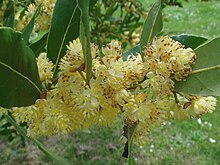Lauraceae

Navigazione
[modifica]| Navigazione: Laurales |
|---|
| Classification System: APG IV
Superregnum: Eukaryota |
Familia: Lauraceae
Tribus: Caryodaphnopsideae – Cassytheae – Cryptocaryeae – Hypodaphnideae – Laureae – Neocinnamomeae
Genera:
Actinodaphne –
Adenodaphne –
Aiouea –
Alseodaphne –
Aniba –
Apollonias –
Aspidostemon –
Beilschmiedia –
Caryodaphnopsis –
Cassytha –
Chlorocardium –
Cinnadenia –
Cinnamomum –
Cryptocarya –
Dahlgrenodendron –
Damburneya –
Dehaasia –
Dicypellium –
Dodecadenia –
Endiandra –
Endlicheria –
Eusideroxylon –
Gamanthera –
Hexapora –
Hypodaphnis –
Iteadaphne –
Kubitzkia –
Kuloa –
Laurus –
Licaria –
Lindera –
Litsea –
Machilus –
Mespilodaphne –
Mezilaurus –
Mocinnodaphne –
Mutisiopersea –
Nectandra –
Neocinnamomum –
Neolitsea –
Nothaphoebe –
Ocotea –
Paraia –
Parasassafras –
Persea –
Phoebe –
Phyllostemonodaphne –
Pleurothyrium –
Potameia –
Potoxylon –
Povedadaphne –
Ravensara –
Rhodostemonodaphne –
Sassafras –
Sextonia –
Sinopora –
Sinosassafras –
Syndiclis –
Triadodaphne –
Umbellularia –
Urbanodendron –
Williamodendron –
Yasunia
Fossil-genera:
†Actinostrobites –
†Androglandula –
†Argapaloxylon –
†Bandulskaia –
†Beilschmiedioxylon –
†Caryodaphnopsoxylon –
†Catula –
†Cinnamomiphyllum –
†Cinnamomophyllum –
†Cinnamomoxylon –
†Cryptocaryoides –
†Cryptocaryoxylon –
†Curtiembrexylon –
†Daphnites –
†Daphnogene –
†Daphnophyllum –
†Fundicutis –
†Heliciaephyllum –
†Lauraceaephyllum –
†Lauraceocyticum –
†Lauraceophylloderma –
†Lauraceophyllum –
†Laurinastrum –
†Laurinoxylon –
†Lauriphyllum –
†Laurocalyx –
†Laurocarpum –
†Lauroflorum –
†Laurogene –
†Laurophyllites –
†Laurophyllum –
†Lauroxylon –
†Linderophyllum –
†Litsaeophyllum –
†Litseopsis –
†Litseoxylon –
†Machilusoxylon –
†Mezilaurinoxylon –
†Nectandrophyllum –
†Ocoteophyllum –
†Ocoteoxylon –
†Paraperseoxylon –
†Perseophyllum –
†Perseoxylon –
†Persites –
†Piliparicutis –
†Potomacanthus –
†Protoravensara –
†Sassafrasoxylon –
†Tetrantheroidea –
†Treptostemon –
†Trianthera
Nome
[modifica]Lauraceae Juss. Gen. Pl. 80 (1789), as "Lauri", nom. cons.
- Genere tipo: Laurus L. Sp. Pl. 1: 369. (1753)
Sinonimi
[modifica]- Heterotypic
- Cassythaceae Bartl. ex Lindl., Nix. Pl.: 15. (1833), nom. cons.
- Perseaceae Horan., Prim. Lin. Syst. Nat.: 61. (1834)
Note: See Discussion Page.
Riferimenti
[modifica]Primary references
[modifica]- Jussieu, A.L. de 1789. Genera plantarum, secundum ordines naturales disposita juxta methodum in Horto Regio Parisiensi exaratam. 498 pp. Paris: Herissant et Theophile Barrois. BHL Reference page.
- Lindley, J. 1833. Nixus Plantarum. London: apud Ridgway et filios. Google Books Reference page.
- Horaninow, P. 1834. Primae lineae systematis naturae, nexui naturali omnium evolutionique progressivae per nixus reascendentes superstructi. Petropoli: Typis Karoli Krajanis. BHL Reference page.
Additional references
[modifica]- Chanderbali, A.S., van der Werff, H. & Renner, S.S. 2001. Phylogeny and historical biogeography of Lauraceae: evidence from the chloroplast and nuclear genomes. Annals of the Missouri Botanical Garden 88(1): 104–134. DOI: 10.2307/2666133 BHL Reference page.
- Huang, J.F., Li, L., van der Werff, H., Li, H.W., Rohwer, J.G., Crayn, D.M., Meng, H.H., van der Merwe, M., Conran, J.G. & Li, J. 2016. Origins and evolution of cinnamon and camphor: A phylogenetic and historical biogeographical analysis of the Cinnamomum group (Lauraceae). Molecular Phylogenetics and Evolution 96: 33–44. DOI: 10.1016/j.ympev.2015.12.007 Reference page.
- Li, J., Christophel, D.C., Conran, J.G. & Li, H.W. 2004. Phylogenetic relationships within the ‘core’ Laureae (Litsea complex, Lauraceae) inferred from sequences of the chloroplast gene matK and nuclear ribosomal DNA ITS regions. Plant Systematics and Evolution 246(1-2): 19–34. DOI: 10.1007/s00606-003-0113-z Full text PDF Reference page.
- Li, J., Conran, J.G., Christophel, D.C., Li, Z.M., Li, L. & Li, H.W. 2008. Phylogenetic relationships of the Litsea complex and core Laureae (Lauraceae) using ITS and ETS sequences and morphology. Annals of the Missouri Botanical Garden 95(4): 580–599. JSTOR Reference page.
- Manchester, S.R. 1994. Fruits and seeds of the Middle Eocene Nut Beds Flora, Clarno Formation, Oregon. Palaeontographica Americana 58: 1–205.
- Meyer, H.W. & Manchester, S.R. 1997. The Oligocene Bridge Creek flora of the John Day Formation, Oregon. University of California Publications in the Geological Sciences 141: 1–364. ISBN 978-0-520-09816-9. Reference page.
- Nishida, S. & van der Werff, H. 2007. Are cuticular characters useful in solving generic relationships of problematic species of Lauraceae? Taxon 56(4): 1229–1237. DOI: 10.2307/25065914 Reference page.
- Song, Y., Yu, W.-B., Tan, Y.-H., Jin, J.-J., Wang, B., Yang, J.B., Liu, B. & Corlett, R.T. 2019. Plastid phylogenomics improve phylogenetic resolution in the Lauraceae. Journal of Systematics and Evolution 58(4): 423–439. DOI: 10.1111/jse.12536
 ResearchGate
ResearchGate  Reference page.
Reference page. - Nishida, S. & van der Werff, H. 2011. An Evaluation of Classification by Cuticular Characters of the Lauraceae: A Comparison to Molecular Phylogeny. Annals of the Missouri Botanical Garden 98(3): 348–357. DOI: 10.3417/2010054 Reference page.
- Rohwer, J.G., Moraes, P.L.R. de, Rudolph, B. & van der Werff, H. 2014. A phylogenetic analysis of the Cryptocarya group (Lauraceae), and relationships of Dahlgrenodendron, Sinopora, Triadodaphne, and Yasunia. Phytotaxa 158(2): 111–132. DOI: 10.11646/phytotaxa.158.2.1 Reference page.
- Werff, H.v.d. 2013. Nomenclatural Notes on Cryptocarya R. Br. (Lauraceae) from Madagascar. Candollea 68(2): 303–306. DOI: 10.15553/c2012v682a14 PDF Reference page.
Collegamenti
[modifica]- Govaerts, R. et al. 2021. Lauraceae in Kew Science Plants of the World Online. The Board of Trustees of the Royal Botanic Gardens, Kew. Published on the internet. Accessed: 2021 Oct. 14. Reference page.
- International Plant Names Index. 2021. Lauraceae. Published online. Accessed Oct. 14 2021.
- Stevens, P.F. 2001 onwards. Angiosperm Phylogeny Website. Version 14, July 2017 [and more or less continuously updated since]. Online. Reference page.
Nomi comuni
[modifica]azərbaycanca: Dəfnəkimilər
беларуская: Лаўровыя
български: Лаврови
català: Lauràcies
čeština: Vavřínovité
dansk: Laurbær-familien
Deutsch: Lorbeergewächse
Ελληνικά: Λαουρίδες
English: Laurel family
Esperanto: Laŭracoj
eesti: Loorberilised
فارسی: برگبوئیان
suomi: Laakerikasvit
Nordfriisk: Loorbeerplaanten
עברית: עריים
हिन्दी: जयपत्र
hrvatski: Lovorovke
hornjoserbsce: Ławrjencowe rostliny
magyar: Babérfélék
հայերեն: Դափնազգիներ
Ido: Lauro
日本語: クスノキ科
Taqbaylit: Tareslant
қазақша: Лавр тұқымдасы
한국어: 녹나무과
kurdî: Famîleya qaran
lietuvių: Lauramediniai
македонски: Ловори
മലയാളം: ലോറേസീ
नेपाली: काउलो
Nederlands: Laurierfamilie, Laurierachtigen
norsk: Laurbærfamilien
polski: Wawrzynowate
русский: Лавровые
svenska: Lagerväxter
తెలుగు: లారేసి
ไทย: วงศ์อบเชย
Türkçe: Defnegiller
українська: Лаврові
oʻzbekcha / ўзбекча: Lavrdoshlar
Tiếng Việt: Họ Nguyệt quế
West-Vlams: Laurierachtign
中文: 樟科
